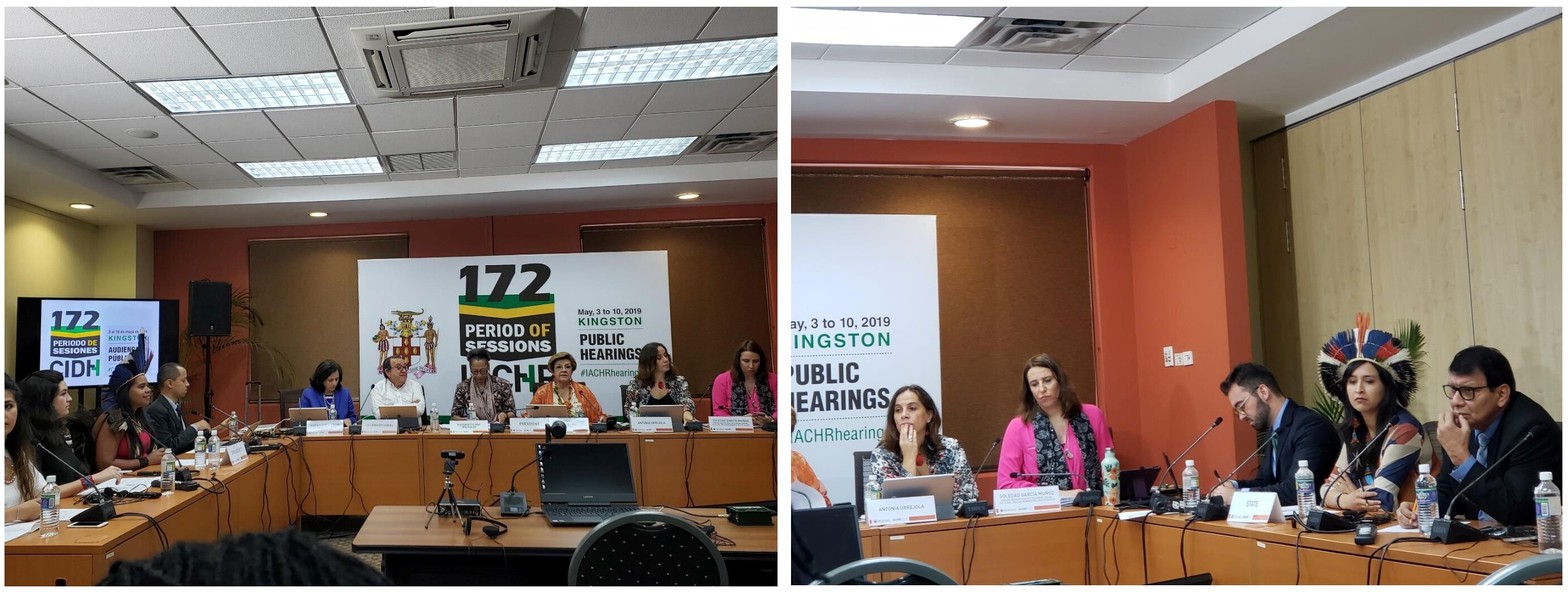The term “narrative” has been bandied about as if it is some kind of magical unicorn. In many sacrosanct human rights circles, once the term is uttered there is the knowing nod, the collective hum of acknowledgment and then a silent acceptance of what I call the Nike© approach to narrative – Just Tell It. But we must resist that impulse. We must be critical of who tells a story, how stories get told, what gets left out of a story and the imperative of stories to drive meaningful action.
The InterAmerican Commission on Human Rights (IACHR), an organ of the Organization of American States, which examines allegations of human rights violations in the American hemisphere, recently held its 172nd Period of Sessions in Kingston, Jamaica. Three sessions, the Protection and Guarantee of the Rights of Indigenous Peoples in Brazil; the Criminalization of Human Rights Defenders of Indigenous Peoples and the Extractive Industry in the United States; and the Criminal System and Alleged Violations of the Rights of African Descendants in Brazil were most revealing for me because they highlighted the often- overlooked nuance of narrative.
What Is Unsaid Is Just As Important As What Is Said
Accompanied and represented by their intrepid legal representative from Divest, Invest, Protect, the Dakota First Nations advocates described their reality in vivid terms – an invasion of sovereign land, a push for integrationism, disrespect for their cultural practices, marginalization of their indigenous councils and the exploitation of natural resources at the expense of First Nations. In response, the USA State representatives spent the majority of their allocated time questioning the institutional authority of the IACHR itself. When the Brazilian advocates spoke about the 2019 Buradhino dam disaster and its devastating impact on the land, bodies and spirits of mostly poor Brazilians, they made no reference to the structural integrity of the dam. Rather, they spoke about the lack of integrity of a political system that favors the powerful. The moral paucity of a country which does not value the lives of the most vulnerable. Conversely, the Brazil State representatives, in a feat of verbal mastery, spoke energetically about the need for better oversight, management and regulations regarding dam construction. Nothing about people. Only the technical and mechanical failings of a dam.

Some of the Best Stories Need No Words. When Anielle Franco, the sister of murdered Brazilian human rights advocate Mariela Franco, spoke about her sister’s legacy, it was as if Marielle’s spirit entered the room for a minute and sat with each of us, daring us to ignore her sacrifice. There were no dry eyes. The majority of the claimants representing First Nations and the Brazilians were women of color. The Brazilian claimants had advocates from seven Brazilian states including Black Women, Mothers of Victims, Quilombolas, African Matrix, Black Media, Favelas and Peripheries. Historians, mothers, human rights advocates – there not to just tell a story, but to speak their reality and insist on a new one. The Brazilian State representatives were predominantly white men but also included one indigenous woman donning an elaborate headdress. She read only prepared statements, did an inordinate amount of speaking compared to the bored-looking men and she seemed to vacillate between stoicism and severe discomfort. Some of the Brazilian and Dakota claimants proudly wore their indigenous garments and were noticeably unimpressed by hers.
Narrative Is Not Passive. It Is An Act of Resistance By Those With Power And Those Without It.
The Brazilian indigenous advocates, accompanied by an AIDA attorney, articulated precise descriptions of the grave environmental and human rights harms being suffered by their communities. They recounted stories of indigenous rights advocates who, as a result of their advocacy, have had bounties placed on their heads or been killed. In response, Brazilian State representatives unveiled a highly curated video. The video focused on “government initiatives”, “indigenous craft enterprise” and the “tremendous potential” that the Amazon has for Brazil’s tourism and other development. It was anachronistic at best, offensive at worst. It purposefully and strategically belied the real harm being suffered by vulnerable indigenous people.
We know stories and narrative matter. But we need to de-magicalize the narrative of narrative. If not, we run the risk of starving story-telling of the politically and socially potent power it possesses. Narrative is no passive tool, no warm and fuzzy trope, no magical unicorn. In the hands of those with power it is a distorted mirror used to shroud or misrepresent the truth. In the hands (and hearts) of earth and human rights advocates it is a potent defense and offense for social justice. As usual, it is black and brown women who are on the physical frontline. But they are also on the story telling frontline, demanding a new reality that respects and protects human and environmental rights and crafting a roadmap for action. We must listen to their stories, then we must do what they say.
****This is one of a 2-part blog series on the IACHR 172nd Period of Sessions in Kingston, Jamaica. The second in the series will focus on the Criminal System and Alleged Violations of the Rights of African Descendants in Brazil session.